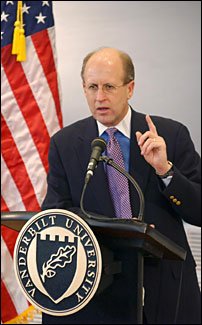U.S. CHIEF ACCOUNTANT WARNS OF IMPENDING ECONOMIC DISASTER

The U.S. Comptroller General, described as our accountant-in-chief, is on a nationwide "wake up America" tour to warn us that we face economic disaster. To bolster his arguments and repel any challenges that his message might be partisan, he's accompanied by economists and budget analysts that represent the full spectrum of political thought.
Their basic message is this: If the United States government conducts business as usual over the next few decades, a national debt that is already $8.5 trillion could reach $46 trillion or more, adjusted for inflation. That's almost as much as the total net worth of every person in America - Bill Gates, Warren Buffett and those Google guys included.
A hole that big could paralyze the U.S. economy; according to some projections, just the interest payments on a debt that big would be as much as all the taxes the government collects today.
And every year that nothing is done about it, Walker says, the problem grows by $2 trillion to $3 trillion.
...
The federal government actually produced a surplus for a few years during the 1990s, thanks to a booming economy and fiscal restraint imposed by laws that were passed early in the decade. And though the federal debt has grown in dollar terms since 2001, it hasn't grown dramatically relative to the size of the economy.
Medicare and Medicaid are the core problems, as healthcare costs have spiraled over the past few decades and are expected to continue doing so for at least the near future. Social Security is viewed as a much smaller problem given that it pays for itself and even provides surplus dollars that the government uses to pay other debts. It's not until the next century, these economists say, that it will become a problem.
(Well, a national health insurance program might go some way towards controlling spiraling healthcare costs. But find one Republican who will consider it.)
Debt, the experts say, is the central cause of our precarious position. "For one thing, even when rates are low a bigger deficit means a greater portion of each tax dollar goes to interest payments rather than useful programs. And because foreigners now hold so much of the federal government's debt, those interest payments increasingly go overseas rather than to U.S. investors."
"Washington tends to keep its fiscal house in better order when one party controls Congress and the other is in the White House, says Sawhill.
"It's kind of a paradoxical result. Your commonsense logic would tell you if one party is in control of everything they should be able to take action," Sawhill says.
But the last six years of Republican rule have produced tax cuts, record spending increases and a Medicare prescription drug plan that has been widely criticized as fiscally unsound. When President Clinton faced a Republican Congress during the 1990s, spending limits and other legislative tools helped produce a surplus.
...
"Realistically what we hope to accomplish through the fiscal wake-up tour is ensure that any serious candidate for the presidency in 2008 will be forced to deal with the issue," he says. "The best we're going to get in the next couple of years is to slow the bleeding."
While the Rethugs are ranting, "Democrats will raise taxes!" we should be countering with, "We'll do whatever it takes to get this nation back on solid financial ground."
Tags: U.S. deficit, Comptroller General David Walker, economic disaster





0 Comments:
Post a Comment
<< Home